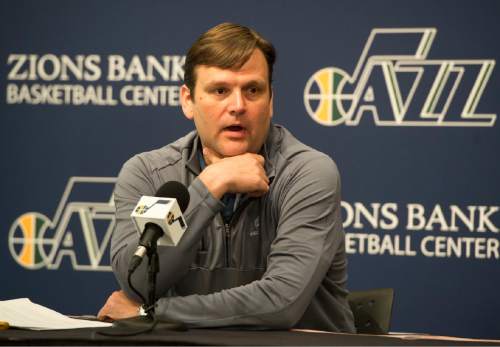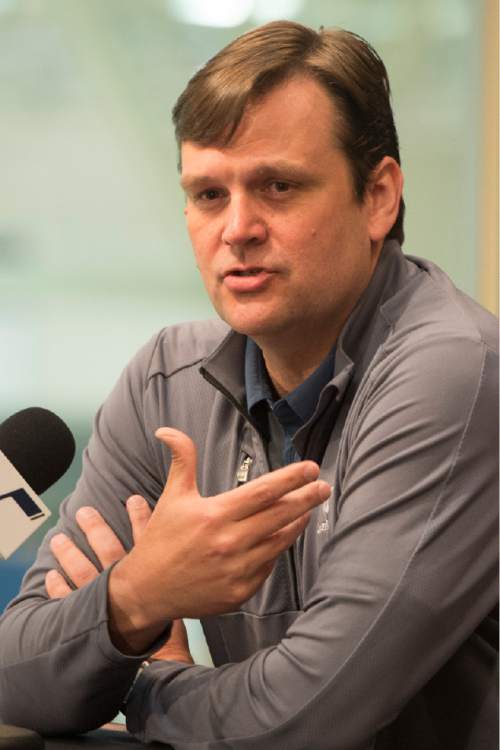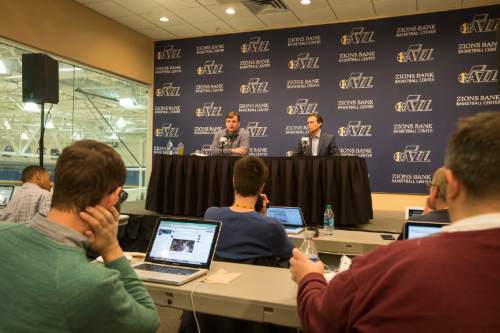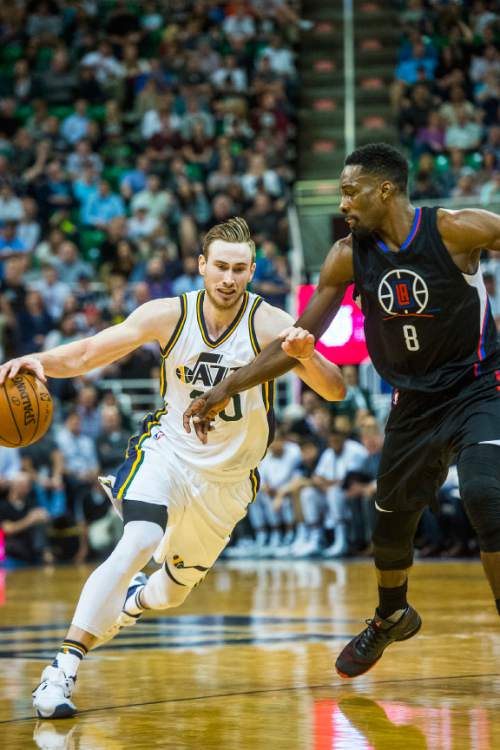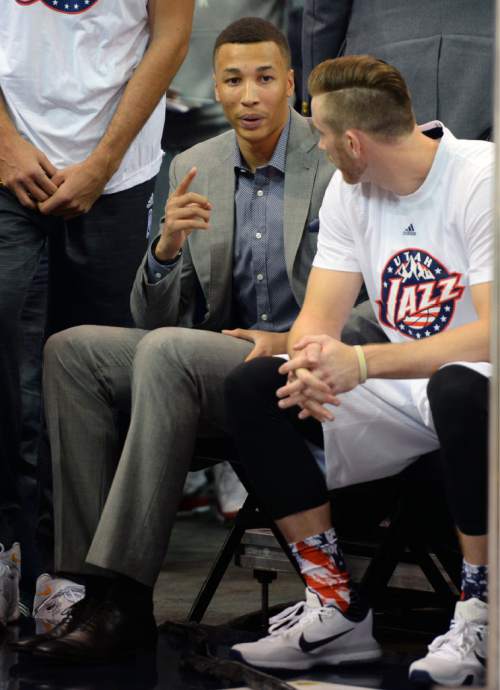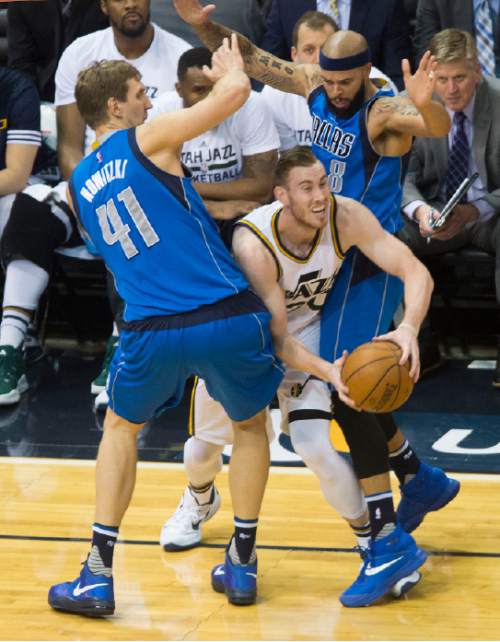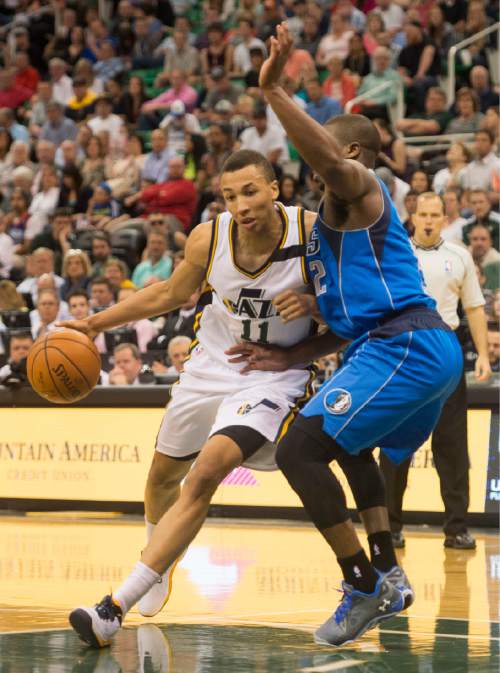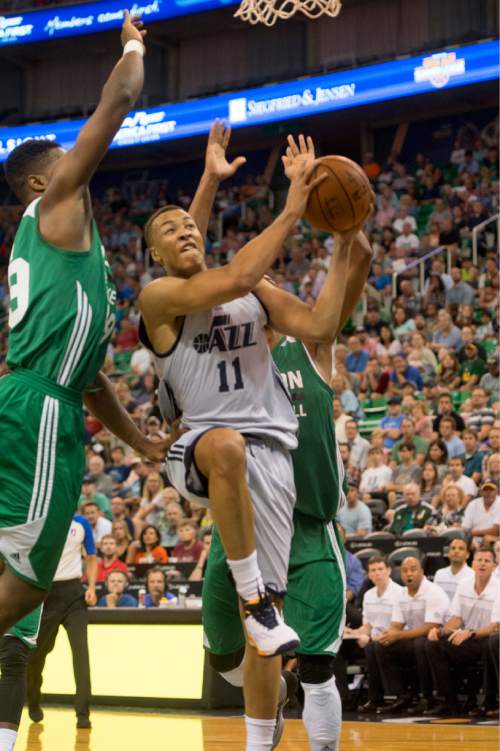This is an archived article that was published on sltrib.com in 2016, and information in the article may be outdated. It is provided only for personal research purposes and may not be reprinted.
More and more, teams rely on sophisticated metrics in their assessments. The Jazz have full-time staff members dedicated to crunching the numbers. But on the eve of training camp last fall, Jazz general manager Dennis Lindsey knew only one would matter at the end of the season.
"We'll be measured by our record," he said. "We're not going to run from that."
Reading the tape now, 40 wins and 42 losses later, there's no doubt the Jazz came up short. The most hopeful season since Lindsey and the Jazz plunged into rebuilding ended as the others had before — headed back to the lottery, not the playoffs.
There will be disappointment and, among some of their playoff hungry faithful, restlessness as the Jazz continue to wander through the wilderness of rebuilding. Lindsey, however, believes the path he's chosen is a good one and that this phase of his plan is almost over.
"If you look at the metrics, we're toward the tail end of that," Lindsey said this past week as he rehashed the ups and downs of an injury plagued season that ended with the Jazz narrowly missing out on a postseason berth.
Now what will the Jazz do next to ensure they take that leap? Let's look at some of the issues and questions facing the Jazz:
Point of emphasis
Point guard, for a second straight summer, is the Jazz's biggest positional question mark. Danté Exum will be back next fall and the 6-foot-6 Aussie and his 6-10 wingspan should immediately provide a defensive boost on the perimeter, where opposing point guards gave the Jazz hell all season long. But will he be ready to make major contributions on offense? Or will he still be feeling the affects of the ACL injury that cost him this season? Even if he is back at full strength, what is reasonable to expect from a 20-year-old who averaged 4.8 points a game in his only NBA season?
The Jazz seem to believe Exum will make an offensive leap.
The trade for Shelvin Mack highlighted how much Utah was lacking at the position before his arrival. Mack was a third string point guard who provided an instant impact. On his best nights, the Jazz hummed, but there were plenty of bad nights, too, as you might expect from a career backup,
Mack would be a serviceable back up to Exum next season, but if the Aussie is going to need an extended time to get back to form, it might make sense for the Jazz to search for an upgrade.
Buying power
Lindsey was noncommittal on Thursday when asked if the Jazz needed to speed up their timeline by either spending big or making a significant move this summer
"One of the worst things that we could do frankly is to overreact," he said. "There won't be anything that won't be examined and if it's quicker to get more experience that may be the right thing to do. Or we may continue to slow growth it as well and hope and work toward better health and continuity. That may provide us the solution as well."
But Lindsey also accepted some blame for not using Utah's cap space last season to bring in more talented, seasoned help. The GM, however, did say that he agreed to two trades last season that would have swapped multiple draft picks, including a first-rounder, in exchange for a veteran player to provide short-term help. In the end, both of those deals fell apart, but it might show Lindsey's willingness to be more aggressive in free agency or in the trade market on draft night. The Jazz will have $28 million in cap space to try to lure talent to Utah. Outside of former MVP Kevin Durant, it isn't exactly a banner crop of free agents, but players like Nic Batum and Jared Dudley could certainly help the Jazz take that next step.
Helping Hayward
Gordon Hayward was once again the Jazz's leading scorer and best player. He was one of 12 guys in the league to average at least 19 points, five rebounds and three assists per game this season and the only one of those 12 not picked for the all-star game.
He was also one of the four who missed out on the playoffs.
"We came into the season with a lot of expectations of making the playoffs," he said at locker clean out on Thursday. "I would have rather been doing this later in the summer."
Hayward struggled at times with turnovers late in games and will regret every clutch shot he failed to convert. "I've got to become a better player for us to be a better team," he said. But the Jazz will also need to prove to Hayward that the team around him is getting better, too. Hayward can opt out of his contract after next season, when the salary cap is expected to spike to more than $100 million, and he will likely command max money and will certainly have plenty of suitors.
As he ended another season early, Hayward said all the right things.
"Going from 20 to 30 to 40 wins, we're trending the right direction," he said. "I just want to win and be part of a winning team. We're headed that way. I'll cross that bridge when I get there as far as the contract and everything."
But the Jazz should make sure Hayward is coming off a trip to the playoffs next summer when it comes time to negotiate.
A bump for Rudy?
While the Jazz have money to spend this summer, they'll still need to be careful with how they spend it. Utah's youngsters will be due raises soon, starting with center Rudy Gobert.
Gobert was a draft-night steal for Lindsey and the Jazz in 2013. Now it's almost time to pay him. The Stifle Tower will be eligible to begin extension talks with the Jazz this summer and the 7-footer will command a whole lot more than the $2 million he's set to make next season, the final year of his rookie deal. In recent years, the Jazz have been able to work out deals with forward Derrick Favors and guard Alec Burks ahead of the Oct. 31 deadline for negotiations. But those talks with Hayward ended without an extension, leaving him to become a restricted free agent.
Any extension for Gobert would kick in for the 2017-18 season when the salary cap is expected to spike to over $108 million.
If Gobert is searching for something close to a max deal, the Jazz could let him play out the last year of his deal, tender a qualifying offer and let him explore restricted free agency knowing that — as was the case with Hayward two years ago — they will be able to match any offer he gets.
There are some question marks about Gobert's game. The center missed 18 games with a knee injury this season and his offensive game is anything but refined at this point. More troubling, however, might be the number of times Gobert was off the court as Snyder matched up against another team's small lineups. Nevertheless, Gobert is among the league's best rim protectors and a key piece of Utah's seventh-ranked defense.
Saying goodbye
Trevor Booker is the Jazz's only unrestricted free agent. The power forward made about $4.9 million last year. He's a high-energy player and a favorite in the locker room, but with the rapidly rising Trey Lyles seemingly poised to take most of the minutes as the backup forward next season, it might make sense to spend elsewhere.
Trey Burke, meanwhile, could be headed out the door, too. A lottery pick in 2013, Burke fell out of the rotation entirely by the end of the season. The Jazz have already picked up Burke's option, but with four point guards under contract next season, the Jazz will have to look to move one of them.
Twitter: @tribjazz —
Six key Jazz dates from 2015-16
Oct. 31 • Jazz 97, Pacers 76
As the Jazz held Indy to just 27 points in the second half, it looked like Utah had the kind of suffocating defense that takes a team to the postseason.
Nov. 30 • Warriors 106, Jazz 103
After falling just short of handing Golden State its first loss of the season, Jazz center Rudy Gobert says the performance shows "that we can be great—not good, great." Two days later in practice, Gobert tore his MCL and missed the next 18 games.
Jan. 27 • Jazz 102, Hornets 73
Rodney Hood scored 24 points as the Jazz stomped Charlotte, kicking off a seven-game win streak just before the all-star break.
Feb. 27 • Nets 98, Jazz 96
The Jazz overlooked a lesser foe and were defeated at home by a Brooklyn team that would win 21 games all year. It would be part of a season-long five-game losing streak.
March 14 • Jazz 94, Cavaliers 85
ESPN in town for the only time all season and Gordon Hayward out with an injury, Rodney Hood scored 28 points to lift his team over LeBron James and the Cavs.
April 8 • Clippers 102, Jazz 99 (OT)
The Jazz were fighting for their playoff lives. Meanwhile, Chris Paul, Blake Griffin and the rest of L.A.'s starting five were back home and watching on the couch. Didn't matter. The Jazz fell flat against the Clippers' bench squad and Jamal Crawford's last-second shot helped kill Utah's postseason chances. The Jazz closed the season with four losses in their final five games. —
Jazz contract status for next season
Player •Status/2016-17 salary
Gordon Hayward • $16 million
Derrick Favors • $11 million
Alec Burks • $10.1 million
Danté Exum • $3.7 million
Trey Burke • $3.3 million+
Tibor Pleiss • $3 million
Shelvin Mack • $2.4 million*
Trey Lyles • $2.3 million
Joe Ingles • $2.1 million
Rodney Hood • $1.4 million
Rudy Gobert • $2.1 million+
Chris Johnson • $1 million *
Jeff Withey • $1 million*
Raul Neto • $937,000
Trevor Booker • Unrestricted free agent
*Non-guaranteed
+ Eligible for extension


